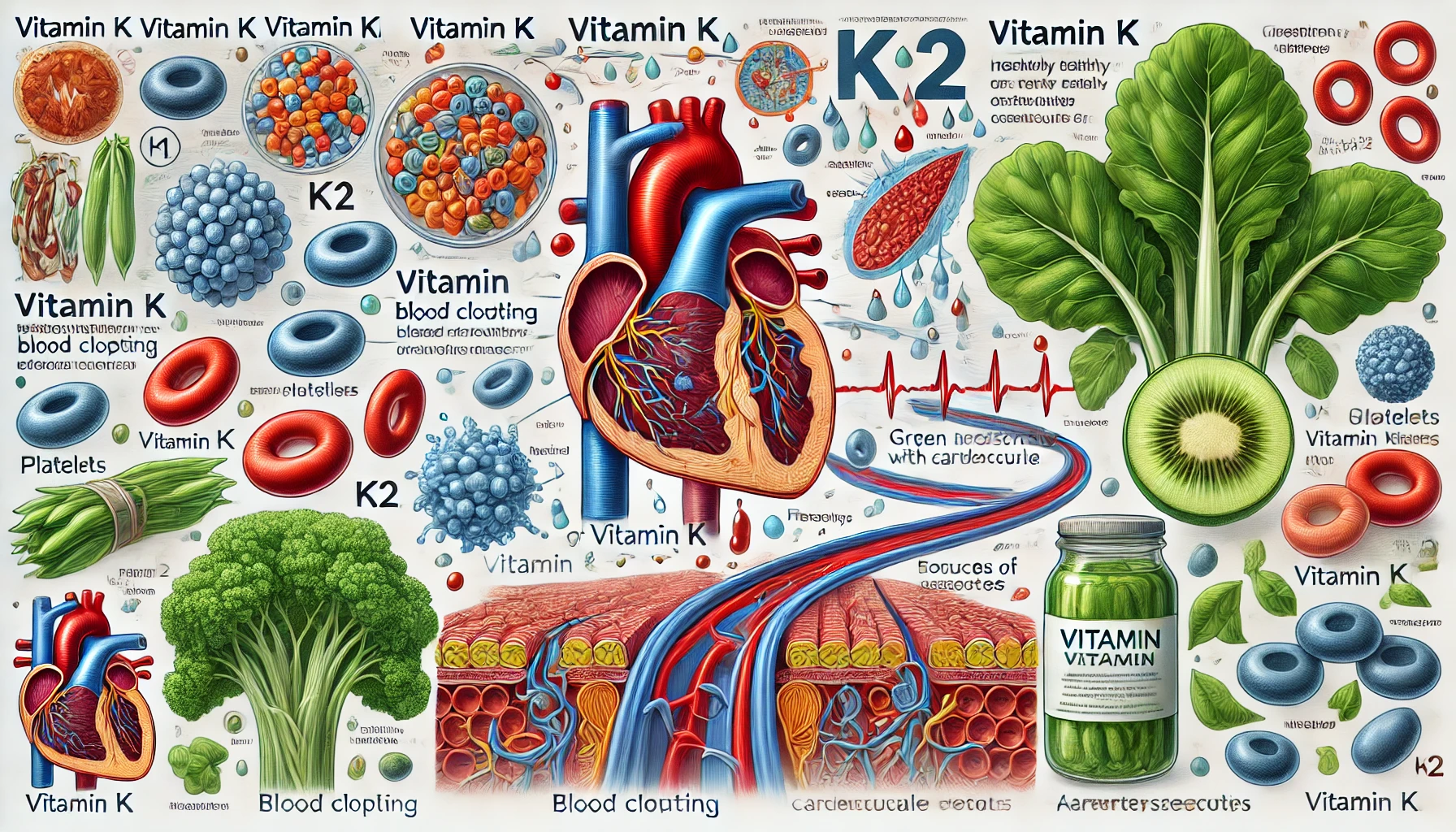Vitamin K helps blood clot and plays an important role in cardiovascular health. K1 is primarily responsible for the activation of blood clotting factors, while K2 prevents calcification of blood vessels, which prevents atherosclerosis and cardiovascular disease. It”s important to get enough vitamin K through green vegetables and fermented foods.
Blood supplies cells with the substances they need and removes waste products. This important role helps keep us alive. If the walls of a blood vessel are damaged and bleed, the blood in the damaged area must clot to stop blood loss. Blood clotting occurs when fibrin, a fibrillar protein, forms a web of fibrin that clumps together with platelet plugs that hold platelets together to form a clot. Blood clotting also occurs in the blood vessels, where the clot is called a thrombus. When arteriosclerosis occurs, which is the thickening of the inner wall of the arteries due to the accumulation of foreign substances, blood clots are deposited in the area and blood flow is reduced, causing vascular disease. Vitamin K plays an important role in blood clotting and circulation.
Vitamin K helps the blood to clot. Researchers discovered that chicks fed a fat-free diet were deficient in a substance that dissolves in fat, causing delayed blood clotting, and named the substance vitamin K. Blood clotting occurs by a chain reaction involving a variety of factors made up of proteins. First, several clotting factors are activated, then prothrombin is activated and converted into thrombin, which in turn converts fibrinogen, which is soluble in the blood, into fibrin, which is insoluble. Vitamin K is involved in the activation of blood clotting factors, including prothrombin, when they are synthesized in liver cells. Activation occurs through binding to calcium ions, and these blood proteins must be carboxylated to bind calcium ions. Carboxylation is the conversion of glutamic acid to gamma-carboxyglutamic acid in the amino acids that make up proteins. Target proteins that need to be carboxylated by vitamin K to be activated are called vitamin K-dependent proteins.

Vitamin K is divided into vitamin K1, which is synthesized in plants, and vitamin K2, which is synthesized in animal cells or produced by microbial fermentation. Green vegetables are a good source of vitamin K1, so if you follow the general recommended diet, you shouldn’t have any problems with blood clotting. But vitamin K’s important functions aren’t limited to blood clotting. Recent studies have shown that vitamin K has anti-inflammatory properties, which can have a positive impact on cardiovascular health. The anti-inflammatory effects of vitamin K may help inhibit the progression of chronic inflammatory diseases such as atherosclerosis.
Another important function of vitamin K related to vascular health has been discovered, and it is related to the calcium paradox. As we age, the density of calcium in our bone tissue decreases, making us more prone to osteoporosis, which is why we take calcium supplements to prevent it. However, calcium supplementation increases blood calcium concentration but does not increase bone density, and vascular calcification, which is the deposition of calcium salts on the walls of blood vessels, leads to arteriosclerosis and vascular disease. Vascular calcification is inhibited by a protein called MGP, which is produced by vascular muscle cells and is a vitamin K-dependent protein. When vitamin K is deficient, the MGP protein cannot be activated, leading to vascular calcification.
Vitamins K1 and K2 both induce the activation of vitamin K-dependent proteins, but K1 is more active in hepatocytes and K2 in other cells. Therefore, K1 is primarily responsible for the activation of blood clotting factors and K2 is primarily responsible for the activation of proteins synthesized in other cells. As a result, some researchers recommend that the recommended intake of vitamin K should be split between K1 and K2, and that people should increase their intake of animal products such as cheese, butter, and other fermented foods that contain K2. Recent studies have also shown that vitamin K2 is particularly effective in preventing atherosclerosis and cardiovascular disease. This emphasizes that vitamin K2 plays an important role in preventing calcium deposits in the blood vessels.
Therefore, it”s very important to consume enough vitamin K to stay healthy. We recommend eating green vegetables regularly, which are rich in vitamin K, and supplementing with vitamin K2 from fermented foods and certain animal products. This will help maintain overall vascular health, not just blood clotting, and reduce the risk of cardiovascular disease.
 I’m a blog writer. I want to write articles that touch people’s hearts. I love Coca-Cola, coffee, reading and traveling. I hope you find happiness through my writing.
I’m a blog writer. I want to write articles that touch people’s hearts. I love Coca-Cola, coffee, reading and traveling. I hope you find happiness through my writing.